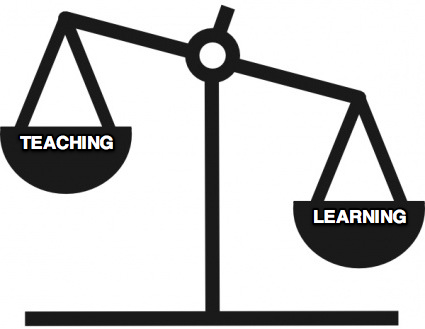Teacher Stories
Submitted on December 8, 2011 by Timothy Boyle
Can you remember the last time your principal looked at data from an assessment you made? I don’t. Do you recall the last time you sat down during a half-day professional development and discussed data that didn’t come from an external testing company? Since I started as a teacher, I can’t think of anything other than PSSAs or predictive test results being the focus of data reviews at staff meetings. It disturbs me how our students are primarily measured by federal, state and local standards using measurements that we didn’t create.
These externally created assessments have created serious problems in our schools. District leadership and administrators bully teachers and students into engaging in teaching and learning activities just for the sake of doing well on these assessments. Students tune out curriculum that is based on outputs like test scores, rather than tuning in to inputs like passion and interest. In an effort to appease the ever-menacing accountability monster, some administrators and teachers put their licenses on the line and cheat. We get these products because assessment is no longer something we do, but rather something that is done to us. Read the rest of this entry »
 My principal recently made it very clear to me that the only written works produced by my 7th and 8th grade students worthy of display, are their constructed responses. In the Philadelphia School District and in my school especially, children are regularly expected to write these limiting and repetitive responses per the direction of our central leadership. According to my principal, it is vitally important that students score the maximum amount of points allowed for the opened-ended responses on the PSSA test. He says that students who do well on the constructed response portion of the PSSA are the ones who obtain the highest overall scores on the test. This reasoning allows administrators like him to believe that putting enormous amounts of educational time and energy into teaching and writing constructed responses will help students achieve the highest scores possible.
My principal recently made it very clear to me that the only written works produced by my 7th and 8th grade students worthy of display, are their constructed responses. In the Philadelphia School District and in my school especially, children are regularly expected to write these limiting and repetitive responses per the direction of our central leadership. According to my principal, it is vitally important that students score the maximum amount of points allowed for the opened-ended responses on the PSSA test. He says that students who do well on the constructed response portion of the PSSA are the ones who obtain the highest overall scores on the test. This reasoning allows administrators like him to believe that putting enormous amounts of educational time and energy into teaching and writing constructed responses will help students achieve the highest scores possible.  Teaching in Philadelphia these days at a time of high-stakes testing requires educators to think beyond our administrative leaders’ expectations of an effective teacher. The Administrative District Teams that walk through our school buildings and classrooms are understandably anxious that students perform well on the standardized state test, but they do not ask the tough questions about how we are truly meeting the needs of our students, and whether or not authentic and deep learning is taking place.
Teaching in Philadelphia these days at a time of high-stakes testing requires educators to think beyond our administrative leaders’ expectations of an effective teacher. The Administrative District Teams that walk through our school buildings and classrooms are understandably anxious that students perform well on the standardized state test, but they do not ask the tough questions about how we are truly meeting the needs of our students, and whether or not authentic and deep learning is taking place. As I sat with our 4th grade teachers during a recent professional development, which introduced the Magnetism and Electricity module, I realized that I had figured out some important things about being a teacher. In my previous role as a science teacher, I had been successful. I attribute much credit to the well-crafted curricula by folks at Lawrence Hall of Science at Berkeley for helping me to help my students to do well in science.
As I sat with our 4th grade teachers during a recent professional development, which introduced the Magnetism and Electricity module, I realized that I had figured out some important things about being a teacher. In my previous role as a science teacher, I had been successful. I attribute much credit to the well-crafted curricula by folks at Lawrence Hall of Science at Berkeley for helping me to help my students to do well in science. As a reading specialist, one of my duties is to identify students who are in need of reading intervention during the school year. In the primary grades (K-2) this is done through teacher observation, review of student work, the student’s ability to work independently and a DIBELS benchmark assessment. However, in the upper grades (3-8) identification relies solely on the results of ONE standardized test. The test was administered in March of the prior school year.
As a reading specialist, one of my duties is to identify students who are in need of reading intervention during the school year. In the primary grades (K-2) this is done through teacher observation, review of student work, the student’s ability to work independently and a DIBELS benchmark assessment. However, in the upper grades (3-8) identification relies solely on the results of ONE standardized test. The test was administered in March of the prior school year. Taking a
Taking a  During my first year of teaching, a coworker did an incredibly kind and helpful thing for me. I was gathering myself at the end of very long day when this individual walked into my classroom and handed me a post-it note. It read, “On 10/12/2008 Sharae said ‘Mr. A. You are my favorite teacher”.
During my first year of teaching, a coworker did an incredibly kind and helpful thing for me. I was gathering myself at the end of very long day when this individual walked into my classroom and handed me a post-it note. It read, “On 10/12/2008 Sharae said ‘Mr. A. You are my favorite teacher”. In recent weeks, I have added a new post category to
In recent weeks, I have added a new post category to